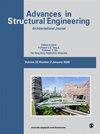Optimization of high-speed angular contact ball bearing for aircraft gearbox utilizing an evolutionary multi-objective algorithm, NSGA-III
IF 2
4区 工程技术
引用次数: 0
Abstract
We develop a program for predicting bearing performance, including the maximum contact stress, bearing power loss, minimum lubricating film thickness, static safety factor, and dynamic life, and an optimal design for high-speed angular contact ball bearings in aircraft gearboxes using optimization algorithms. A program is developed to predict bearing performance by calculating the loads and displacements of individual balls based on the bearing’s kinematic and static equilibrium equations. Next, an optimization program is developed with non-dominated sorting genetic algorithm III (NSGA-III), wherein calculated bearing performance indicators serve as constraints or objective functions. The performance of individuals within the final Pareto front is evaluated using the inter-criteria correlation (CRITIC) and weighted product methods. The optimization performances of NSGA-III and NSGA-II are compared based on their hypervolume indicators. A solution of the kinematic and static equilibrium equations under the load cases and duty cycles of real aircraft gearboxes is obtained, enhancing the prediction accuracy. Furthermore, optimization, including bearing performance metrics rarely considered in previous studies, is performed. Optimal specifications superior to reference bearings employed in aircraft gearboxes are obtained, enhancing all three objective functions or specific objective functions. The optimization performance of NSGA-III is confirmed to surpass that of conventional NSGA-II.利用进化多目标算法 NSGA-III 优化飞机齿轮箱用高速角接触球轴承
我们开发了一种预测轴承性能的程序,包括最大接触应力、轴承功率损失、最小润滑膜厚度、静态安全系数和动态寿命,并使用优化算法对飞机齿轮箱中的高速角接触球轴承进行了优化设计。根据轴承的运动学和静态平衡方程,通过计算单个球的载荷和位移,开发了一个预测轴承性能的程序。接着,使用非支配排序遗传算法 III (NSGA-III) 开发了一个优化程序,将计算出的轴承性能指标作为约束条件或目标函数。使用标准间相关性(CRITIC)和加权乘积法评估最终帕累托前沿内个体的性能。根据超体积指标,比较了 NSGA-III 和 NSGA-II 的优化性能。在实际飞机齿轮箱的负载情况和工作周期下,获得了运动和静态平衡方程的解,提高了预测精度。此外,还进行了优化,包括以往研究中很少考虑的轴承性能指标。获得了优于飞机齿轮箱中使用的参考轴承的最佳规格,增强了所有三个目标函数或特定目标函数。经证实,NSGA-III 的优化性能超过了传统的 NSGA-II。
本文章由计算机程序翻译,如有差异,请以英文原文为准。
求助全文
约1分钟内获得全文
求助全文
来源期刊

Advances in Mechanical Engineering
Engineering-Mechanical Engineering
自引率
4.80%
发文量
353
期刊介绍:
Advances in Mechanical Engineering (AIME) is a JCR Ranked, peer-reviewed, open access journal which publishes a wide range of original research and review articles. The journal Editorial Board welcomes manuscripts in both fundamental and applied research areas, and encourages submissions which contribute novel and innovative insights to the field of mechanical engineering
 求助内容:
求助内容: 应助结果提醒方式:
应助结果提醒方式:


